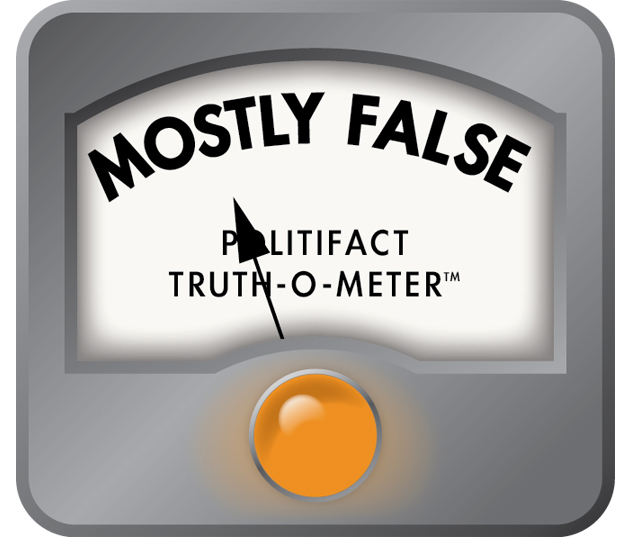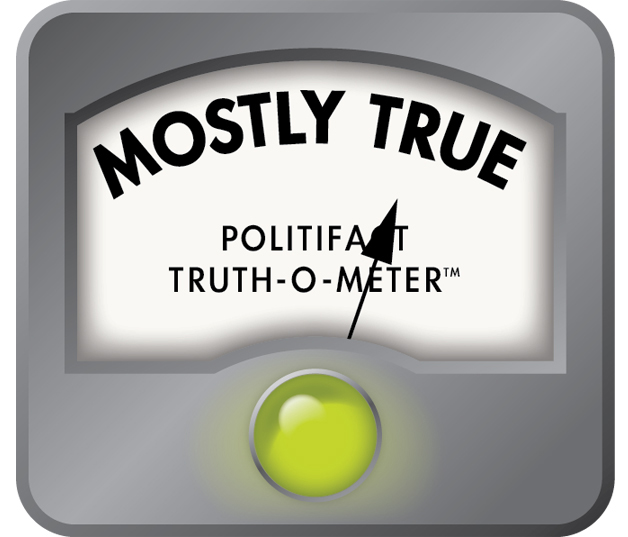Stand up for the facts!
Our only agenda is to publish the truth so you can be an informed participant in democracy.
We need your help.
I would like to contribute
This article is for you.
Ahead of Election Day, we asked our readers what claims they would like to see checked.
Dozens responded to us, from coast to coast, with questions and requests, so we got to work on finding answers. We addressed the topics of immigration, the caravan, birthright citizenship, taxes, the Florida Senate race and the governors' races in Florida and Wisconsin.
That’s what the Trump administration says, but we aren’t able to verify it with reported examples.
The Department of Homeland Security, in a Nov. 1 "myth vs. fact" statement, said, "Over 270 individuals along the caravan route have criminal histories, including known gang membership."
Sign up for PolitiFact texts
PolitiFact asked the department how it determined that number and their criminal background. An official said only that it was "law-enforcement sensitive."
After Trump said he was sending troops to the border, reporters on Oct. 30 asked Gen. Terrence John O'Shaughnessy, Commander of U.S. Northern Command, if there were any terrorists in the caravan.
"I'm not going to answer those specific question with respect to the intel of that," O'Shaughnessy said. "I will say that we are working closely with (Customs and Border Protection) to understand the nature and the makeup of this caravan."
O'Shaughnessy said this caravan was different from others because "we've seen violence coming out of the caravan."
Trump could not change the Constitution through an executive order — that would require a constitutional amendment. But if he issued an executive order on birthright citizenship, it would almost certainly force the courts to rule on the question.
The 14th Amendment to the Constitution says that "all persons born or naturalized in the United States, and subject to the jurisdiction thereof, are citizens of the United States and of the state wherein they reside." That language is echoed in a 1952 statute, and in 1898, the Supreme Court ruled that those born on U.S. soil, with a few clear exceptions, qualified for citizenship under the 14th Amendment.
However, the 1898 Supreme Court decision didn’t address the scenario in which an undocumented immigrant gave birth on U.S. soil. Critics of birthright citizenship could try to pursue a court case based on that legal fuzziness, and an executive order would be one way to precipitate a legal battle.
So Trump couldn’t change birthright citizenship on his own through an executive order. It would be up to the courts to decide the ultimate outcome.
No, it’s not the only one, though the policy isn’t universal.
As we’ve noted, the United States is one of roughly 30 countries around the world that offer citizenship to every person born on their soil. Among those, the United States admits the highest number of immigrants per year. The other advanced industrialized nation that has a similar policy is Canada. Most other developed countries have added more requirements for citizenship. So the United States is not alone in this policy, but it is somewhat of an outlier among its peers.
That’s misplaced blame. We rated an accusation by Trump along these lines Pants on Fire.
Trump tweeted a campaign-style video Oct. 31 about two California sheriff officers who were shot to death by an immigrant in the country illegally.As a man named Luis Bracamontes boasts about killing the two officers and saying he would kill more if he could, new text says, "Democrats let him into our country." That’s quickly followed with, "Democrats let him stay."
Democratic and Republican administrations deported Bracamontes, but also failed to keep Bracamontes out of the United States. Bracamontes’ last illegal entry was under President George W. Bush, a Republican. We found no evidence that he was proactively allowed to stay.
The situation varies a bit from candidate to candidate. Incumbent Republican members of Congress running this year may have voted to repeal the Affordable Care Act, which is the key law ensuring this coverage. In addition, Republican state attorneys general who are running for higher office may have signed on to a lawsuit seeking to overturn the law. By contrast, a local official now running for Congress may have no vote record at all on this question, making it easier to make this argument.
That said, we have concluded that Republicans who have voted for a congressional repeal bill or signed on to the repeal lawsuit don’t have a strong case to make that they’re working to safeguard pre-existing condition protections. None of the past or current legislative proposals that would replace the Affordable Care Act offer the same degree of protection for patients with pre-existing conditions.
Yes, for the next few years. But it’s set to shrink eventually. So it depends on the time frame you’re asking about.
The 2017 law — passed without any Democratic support — cut the corporate income tax rate, changed international tax rules, and reduced taxation on so-called "pass-through" business income taxed on personal filings. The law also raised the standard deduction while curbing the alternative minimum tax and raising the threshold for applying the estate tax exemption
Overall, the good news for taxpayers is that every income group would pay less in taxes in 2019. (Individual taxpayers may not necessarily gain, depending on their specific circumstances.) The benefits of the tax bill would flow disproportionately to wealthier taxpayers.
Meanwhile, the benefits for lower- and moderate-income taxpayers are front-loaded. They largely disappear by 2027.
By 2027, almost 76 percent of households in the top 1 percent would see a tax cut, and almost 92 percent of households in the top 0.1 percent would see a tax cut. (The top 1 percent in 2027 are projected to earn $912,000, and the top 0.1 percent is projected to be making more than $5 million a year.)
By contrast, fewer than one-third of taxpayers in the bottom 80 percent of the income spectrum would see a tax cut in 2027.
Why the big changes by 2027? The primary reason is that some of the individual tax cuts phase out in 2025. In addition, some of the inflation adjustments used under the bill are less generous than the current ones.
They would have that power, but that doesn’t mean they’ll use it.
According to the Constitution, impeachment may be pursued against "the President, Vice President, and all civil Officers of the United States" for "Treason, Bribery, or other high Crimes and Misdemeanors."
The definition of "high crime or misdemeanor" is vague -- essentially, it is whatever a majority of the House agrees to. Removal requires the additional step of a two-thirds vote in the Senate.
But while the definition is vague, the recent historical record indicates that impeachment of judges tends to occur only when there are clearly criminal acts. The House has impeached 13 judges, with the Senate approving removal in eight cases.
Basically, no. An ad said that Nelson had voted for "cuts to Medicare providers" and voted to "weaken Social Security protections" as a senator in the 2000s. But that claim is misleading.
Nelson’s votes neither weakened Social Security nor eroded the position of Medicare providers, experts said. One 2013 vote actually prevented a larger cut to Medicare providers, and the Social Security votes in the 2000s can just as easily be portrayed as a "stalking horse" for personal accounts.
The ad also ignored other actions Nelson has taken to protect Medicare and Social Security. We rated this statement Mostly False. (Read the full fact-check.)
He did. It happened in a deposition in a civil business lawsuit, and not the better-known case of the federal government’s criminal fraud investigation into his company, Columbia/HCA, that ultimately resulted in $1.7 billion in civil and criminal fines and civil damages and penalties. However, Scott also used the Fifth Amendment in that federal investigation.
The Fifth Amendment reads in part that no one "shall be compelled in any criminal case to be a witness against himself."
When Scott gave a deposition in the civil suit in 2000, he invoked the Fifth Amendment 75 times.
"Under normal circumstances, Mr. Scott would be pleased to answer that question and other questions that you pose today," Scott's lawyer, Steven Steinbach, said in the deposition. "Unfortunately because of the pendency of a number of criminal investigations relating to Columbia around the country, he's going to follow my advice, out of prudence, to assert his constitutional privilege against giving testimony against himself."
Scott then went on to read the same answer, even when asked if Scott is a current or former employee of Columbia/HCA: "Upon advice of counsel, I respectfully decline to answer the questions by asserting my rights and privileges under the Fifth Amendment of the U.S. Constitution."
It’s hard to give a definitive answer. An FBI investigation of alleged corruption in Tallahassee has been ongoing at least since 2015, though it has not resulted in any charges and any timeline for potential charges has not been publicly announced.
The only evidence publicly known is that Gillum has cooperated with the investigation, including meeting with the FBI. Gillum has said that the FBI told him he was not the focus of the investigation.
(Read more about aspects of the case here and here.)
It depends how you measure it.
Gillum’s Republican opponent, Ron DeSantis, said Gillum has presided over "the highest crime in Florida four years running."
That’s basically right, if you refer to the crime rate in Leon County, which on a numerical basis consists largely of Tallahassee. Data shows that Leon County has had the highest crime rate in Florida in recent years. We rated this statement Mostly True.
But Gillum’s backers can point to a different way of framing the numbers that’s also Mostly True — that Tallahassee "is experiencing a five-year low in our crime rate." The crime rate in Tallahassee was 5,764.5 per 100,000 people in 2017. The last time it was lower was in 2013.
That voicemail is misleading. There is no proposal among Democrats to add a state income tax, which would be highly unpopular in Florida.
The voicemail was from party chairman Blaise Ingoglia, encouraging voters to return their absentee ballots.
Gillum, the Democratic nominee for governor, has repeatedly said that he wouldn’t propose a state income tax. Instead, he’s said he wants to increase the corporate tax rate to generate an extra $1 billion for education.
It’s worth adding that a state income tax would face stiff opposition in the Republican-dominated Legislature and would require 60-percent passage by voters to change the Constitution.
That’s an exaggeration. Evers has said he is open to raising the tax, which is now 32.9 cents per gallon, but the $1 figure comes from Walker. While Evers has said he "has no range" of how large an increase he would consider, he has called a $1 increase "ridiculous."
PolitiFact Wisconsin rated this statement Mostly False. (Read the full fact-check.)
Our Sources
James Madison Institute, "Election 2018: Platforms, proposals, projections," October 2018
Meet the Press, Transcript, Aug. 29, 2018
Tampa Bay Times, "Ron DeSantis veers into the absurd in bid to raise fear and doubt on Andrew Gillum," Sept. 16, 2018
Interview, Kurt Wenner, Florida TaxWatch, Oct. 4, 2018
Interview, Blaise Ingoglia, Republican Party of Florida chairman, Nov. 2, 2018
See individual fact-checks for additional sources


 PolitiFact Rating:
PolitiFact Rating: 
 PolitiFact Rating:
PolitiFact Rating:  PolitiFact Rating:
PolitiFact Rating: 
 PolitiFact Rating:
PolitiFact Rating: 









































